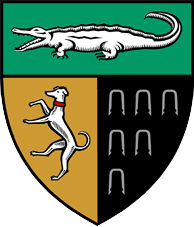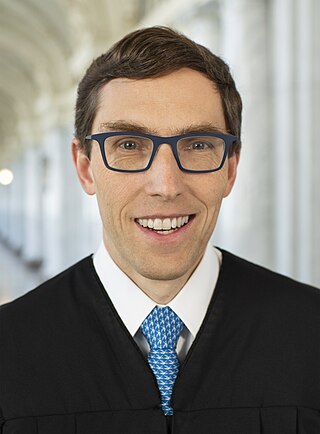
Law and economics, or economic analysis of law, is the application of microeconomic theory to the analysis of law. The field emerged in the United States during the early 1960s, primarily from the work of scholars from the Chicago school of economics such as Aaron Director, George Stigler, and Ronald Coase. The field uses economics concepts to explain the effects of laws, to assess which legal rules are economically efficient, and to predict which legal rules will be promulgated. There are two major branches of law and economics; one based on the application of the methods and theories of neoclassical economics to the positive and normative analysis of the law, and a second branch which focuses on an institutional analysis of law and legal institutions, with a broader focus on economic, political, and social outcomes, and overlapping with analyses of the institutions of politics and governance.

Yale Law School (YLS) is the law school of Yale University, a private research university in New Haven, Connecticut. It was established in 1824 and is one of the most selective academic institutions in the world. The 2020–21 acceptance rate was 4%, the lowest of any law school in the United States. Its yield rate of 87% is also consistently the highest of any law school in the United States.

John Hart Ely was an American legal scholar. He was a professor of law at Yale Law School from 1968 to 1973, Harvard Law School from 1973 to 1982, Stanford Law School from 1982 to 1996, and at the University of Miami Law School from 1996 until his death. From 1982 until 1987, he was the 9th dean of Stanford Law School.
The Columbia Law Review is a law review edited and published by students at Columbia Law School. The journal publishes scholarly articles, essays, and student notes.

Samuel Anthony Alito Jr. is an American jurist who serves as an associate justice of the Supreme Court of the United States. He was nominated to the high court by President George W. Bush on October 31, 2005, and has served on it since January 31, 2006. After Antonin Scalia, Alito is the second Italian American justice to serve on the U.S. Supreme Court.
Jenny S. Martínez is an American legal scholar and Stanford University's 14th provost. Stanford University President Richard Saller named her to the position in August 2023, effective October 1, 2023. Martinez succeeds Persis Drell, who announced in May that she would step down as provost. From April 2019 to September 2023, she served as the Dean of Stanford Law School. She joined the Stanford faculty in 2003, and has taught courses on constitutional law, international law, and human rights. She is a leading expert on international law and constitutional law, including comparative constitutional law. She is the author of The Slave Trade and the Origins of International Human Rights Law and numerous articles in leading academic journals.

The Law School at the College of New Jersey was a department of Princeton University from 1847 until 1852. It began instruction in 1847 as a modest effort consisting of three professors: Joseph Coerten Hornblower, Richard Stockton Field, and James S. Green. Only seven students obtained a law degree before the school closed in 1852. The short-lived experiment was the furthest the university got in a recurring ambition, marked by varying levels of effort, to establish a law school. Previously, in the 1820s, an attempt was made to organize teaching in law, but this plan ended following the death of the designated professor.

Sonia Maria Sotomayor is an American lawyer and jurist who serves as an associate justice of the Supreme Court of the United States. She was nominated by President Barack Obama on May 26, 2009, and has served since August 8, 2009. She is the third woman, first woman of color, the first Hispanic, and first Latina to serve on the Supreme Court.
The unitary executive theory is a normative theory of United States constitutional law which holds that the President of the United States possesses the power to control the entire federal executive branch. The doctrine is rooted in Article Two of the United States Constitution, which vests "the executive Power" of the United States in the President. Although that general principle is widely accepted among legal scholars, there is disagreement about the strength and scope of the doctrine. In 2008, Steven Calabresi and Christopher Yoo described the unitary executive theory as ensuring "the federal government will execute the law in a consistent manner and in accordance with the president’s wishes." This stands in contrast to other scholarly literature, such as MacKenzie in 2008 and Crouch, Rozell, and Sollenberger in 2020, that stresses the fact that federal employees have to faithfully execute the laws enacted according to the process prescribed in the U.S. Constitution.

Phi Alpha Delta Law Fraternity, International is the largest professional law fraternity in the United States. Founded in 1902, P.A.D. has since grown to 717 established pre-law, law, and alumni chapters and over 330,000 initiated members. Application for membership to Phi Alpha Delta is available to undergraduate students, law school students, lawyers, judges, and politicians.

Notre Dame Law School is the professional graduate law school of the University of Notre Dame. Established in 1869, it is the oldest continuously operating Catholic law school in the United States.
Charles Alan Reich was an American academic and writer best known for writing the 1970 book, The Greening of America, a paean to the counterculture of the 1960s. Excerpts of the book first appeared in The New Yorker, and its seismic reception there contributed to the book leading The New York Times Best Seller list. Due to the theme and implications of this book Reich was described as a "high priest of antitechnology".
Richard Abraham Primus is an American legal scholar. He currently teaches United States constitutional law at the University of Michigan Law School, where he is Theodore J. St. Antoine Collegiate Professor of Law. In 2008, he was awarded a Guggenheim Fellowship for his work on the relationship between history and constitutional interpretation.
Steven Gow Calabresi is an American legal scholar and the Clayton J. and Henry R. Barber Professor of Law at Northwestern University. He is the co-chairman of the Federalist Society. He is the nephew of Guido Calabresi, a U.S. Appellate judge and former dean of the Yale Law School.
Catherine Moira Sharkey is a professor of law at the New York University School of Law.

William Nichol Eskridge Jr. is American academic and the John A. Garver Professor of Jurisprudence at Yale Law School. He is one of the most cited law professors in America, ranking fourth overall for the period 2016–2020. He writes primarily on constitutional law, legislation and statutory interpretation, religion, marriage equality, and LGBT rights.
Michael J. Gerhardt is the Samuel Ashe Distinguished Professor of Constitutional Law at the University of North Carolina School of Law in Chapel Hill. He is also the director of the Center on Law and Government at the University of North Carolina at Chapel Hill and is an expert on constitutional law, separation of powers, and the legislative process. He is a Scholar in Residence at the National Constitution Center and visiting scholar at the University of Pennsylvania Law School. On December 2, 2019, it was announced that Gerhardt would testify before the House Judiciary Committee regarding the constitutional grounds for presidential impeachment in the impeachment inquiry against Donald Trump.

Risa Lauren Goluboff is an American lawyer and legal historian who serves as the 12th dean of the University of Virginia School of Law; she is the first woman to hold the position. She is also the Arnold H. Leon Professor of Law and a professor of history at the University of Virginia.

Eric David Miller is an American attorney and jurist serving as a United States circuit judge of the United States Court of Appeals for the Ninth Circuit.
The History of the American legal profession covers the work, training, and professional activities of lawyers from the colonial era to the present. Lawyers grew increasingly powerful in the colonial era as experts in the English common law, which was adopted by the colonies. By the 21st century, over one million practitioners in the United States held law degrees, and many others served the legal system as justices of the peace, paralegals, marshalls, and other aides.











